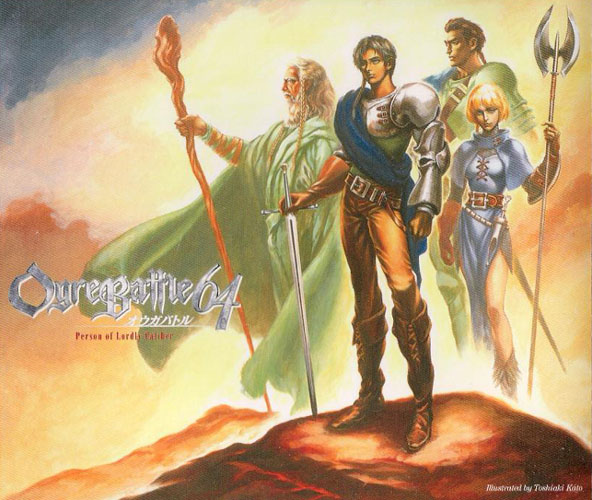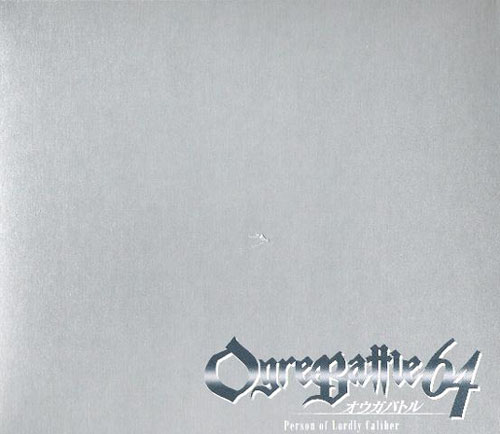The Nintendo 64 sound chip became obsolete quickly compared to the quality of sound in PlayStation games, because of the limited space in a cartridge. It basically has the sound of a slightly updated MIDI processor. However, despite this, some games on the system were able to either surpass the sound chip’s normal capabilities, or make up for it with compositional quality. Ogre Battle 64‘s sound track does each of these things to a degree, but neither superbly.
The synthesizer quality on this soundtrack is very good. The orchestral feel of the music is put forth well by the excellent range of instruments that can be heard here: woodwinds, strings, brass of many kinds, and even some dissonant (purposefully, like in Shiro Sagisu’s “Interference of Others” from End of Evangelion) piano. The instruments produce very distinct tones, and the synth choir used here even sounds good. However, the disc has a slightly muted sound to it on the whole, which makes it seem worse than it is.
The main composer on the project was Hayato Matsuo, and it often resembles his work on Front Mission 3, sans electronic influences. Here we find orchestral music with the ubiquitous Strategy RPG militaristic marches and a general feel not far removed from other games of the genre, such as Final Fantasy Tactics (which also had Iwata and Sakimoto as composers). A hint of dissonance appears in most of his work: just enough to create an unsettling feeling with tense moments, but not to overwhelm the melodic elements entirely. Tracks such as “World-Shaking,” “The World of Today,” and the oddly titled “Rrrowf” exemplify this. Also of note are Matsuo’s re-arranged versions of “Revolt” and “Accretion Disc,” “Revolted” and “Far Away.” I prefer “Revolted” myself, but they are both very good.
There are a number of sad or reflective themes that get away from that element, however — most of the ending music, the mournful yet not melodramatic “The Funeral,” and the synth choral track “Amazing Grace” (no relation to the hymn). Matsuo is as skilled at manipulating music for a darker mood as a lighter one. Interestingly enough, the first few notes of “The Lingering Imagery” are the same as the opening of “Jema’s Realization” from Seiken Densetsu.
Masaharu Iwata and Hitoshi Sakimoto make some significant contributions as well, although quite a few of them are taken from Ogre Battle and Tactics Ogre. Ogre Battle standbys such as “Overture” and “Revolt” are given slight re-arrangement here, not to mention a full synth upgrade. Sakimoto also writes some new material such as the short yet compelling “War Situation” and the ominous “Notice of Death.” Iwata contributed more than Sakimoto, but still not as much as Matsuo. The main battle theme “Decisive,” although short, works very well both inside and outside the game, and themes such as “Vague” and my personal favorite “Fog of Phantom” give the soundtrack a darker edge.
The soundtrack takes up a single disc, which has 61 tracks on it. The obvious conclusion is that none of them are looped. Sometimes, this makes the shorter tracks feel excessively brief, and the longer tracks feel incomplete. It isn’t as much of a problem when the average track is longer than 2 minutes, but when nearly all of them are shorter than that, a run through of the CD feels like listening to only track clips at times.
The other two discs include, per Ogre Battle tradition, MIDI arrangements of every single track on the OST disc. These are looped. The advantage to MIDI is an obvious improvement in clarity. The OST disc can sound slightly muffled at times, but every single instrument in MIDI is clear as a bell: which, with MIDI, isn’t always a great thing. Some instruments, such as most percussion and short horn bursts, sound fine in MIDI, but others, such as sustained brass and synthesized voice, sound awful. Also, the volume balance between instruments doesn’t seem as fine tuned. If the soundtrack were to have a Super Famicom-synth disc to compare, having the MIDI disc would be an obvious advantage, but with the higher quality of the N64, the advantage becomes dubious. I would actually prefer it if the OST took up two discs, and the MIDI arrangements took up the other, and I wouldn’t mind too much if they were left off entirely. Perhaps it would be better if the discs sounded more like the “Full Sound Disc” on Final Fantasy Tactics Advance‘s OST. The discs certainly aren’t bad, however, and some of the arrangements sound fine. Those ones are really nice of which to have a looped version.
Is it as good as the Final Fantasy Tactics OST? No. Is it as good as Front Mission 3? No. While it is not by any means a masterpiece, nor highly unique, Ogre Battle 64 is a very good soundtrack that fans of Iwata, Matsuo, and Sakimoto will appreciate. Unfortunately, it has been out of print for a few years, and GMO has stopped carrying it. I was lucky enough to find a still-sealed copy on eBay, so if you’re interested, look there. It may not be worth the price you would pay, but for fans of the game it’s a good deal if you can find it for under $55.





